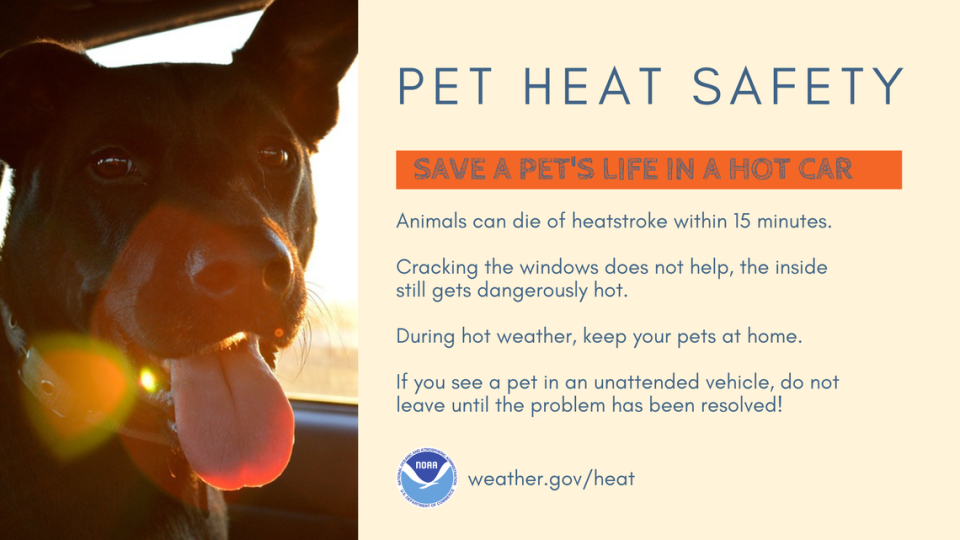Blistering heat is the deadliest weather hazard. Here’s how to stay cool this summer
Tornadoes, hurricanes and floods often capture the public’s attention, but it’s the extreme heat that’s deserving of more awareness — it’s the No. 1 weather-related killer.
Excessive heat claimed an average of 138 lives per year in the U.S. from 1990 through 2019, according to the National Weather Service.
That’s higher than the average annual death tolls from flooding, 88, tornadoes, 65, and hurricanes or tropical storms, 45, in that 30-year-period.
There have been years where other hazardous weather events eclipsed heat-related deaths. In 2005, for example, as many as 1,800 people died in Hurricane Katrina, according to the Associate Press Stylebook. And in April 2011, an outbreak of tornadoes killed 324 people in the southeast and 158 people in Joplin.
But extreme heat typically takes more lives on a yearly basis.
During the summer, the high temperatures and high humidity can be dangerous in the Midwest. In 2019, 11 Missourians and six Kansans died of excessive heat, according the latest statistics from state health officials.
There are steps you can do to prepare for the heat. The first is being aware of the forecast. The National Weather Service issues excessive heat warnings, watches and advisories.
The general rule of thumb is that warnings are issued when the heat index is expected to be 105 degrees or higher for at least two days and overnight temperatures will not drop below 75 degrees, according to the weather service.
Watches are issued when conditions are favorable for an excessive heat event, but its occurrence and timing are uncertain.
Advisories are generally issued when the heat index is expected to be above 100 degrees or higher for at least two days and overnight temperatures will not drop below 75 degrees.
When extreme hits, ready.gov had these tips:
Find air conditioning.
Avoid strenuous activities.
Wear light clothing.
Check on family members and neighbors.
Drink plenty of fluids.
Watch for heat cramps, heat exhaustion and heat stroke.
Never leave children, disabled person or pets in a closed car.

While fans are another useful way to find comfort, they have their limitations. When temperatures reach the high 90s, fans will not prevent heat-related illnesses, according to the Centers for Disease Control and Prevention.
Using fans alone when the heat index exceeds 99 degrees can speed up the onset of heat-related illnesses, according to the U.S. Environmental Protection Agency.
“Generally, portable electric fans may not be a practical and safe cooling mechanism during an EHE (extreme heat event) in homes that are already hot and are not air-conditioned; their use should be discouraged unless the fans are bringing in significantly cooler air from outside the dwelling,” the EPA said.
Instead, people should take a cool shower or bath, drink cool nonalcoholic beverages or go to an air-conditioned place, like a shopping mall, public library or community center.
For cooling centers near you, search the United Way of Greater Kansas City’s and the Missouri Department of Health and Senior Services’ websites. Or call the United Way’s 2-1-1 line for resources.
In Missouri, people can call the state’s toll-free abuse and neglect hotline at (800) 392-0210 to report senior citizens or adults with disabilities suffering from the heat and in need of assistance.
The Salvation Army’s Kansas and Western Missouri Division is currently with Westlake ACE Hardware to raise money for its annual fan drive, said Amy Warren, project manager for the Salvation Army’s Kansas and Western Missouri Division.
The Salvation Army plans to distribute the fans on July 20. For those who can’t wait for the distribution date, they are encouraged to contact their nearest Salvation Army community center.
The Salvation Army will once again be opening all eight of its community centers across the Kansas City metro as cooling centers from 10 to 4 p.m. Monday through Friday when Kansas City’s health department declares a heat emergency.
Salvation Army community center locations are:
Bellefontaine Community Center, 3013 E. Ninth St..
Blue Valley Community Center, 6618 E. Truman Road.
Westport Community Center, 500 W. 39th St.
Northland Community Center, 5306 N. Oak Trafficway, Kansas City, North.
Southland Community Center, 6111 E. 129th St., Grandview.
Independence Community Center, 14700 E. Truman Rd., Independence.
Harbor Light Village, 6723 State Ave., Kansas City, Kansas.
Olathe Community Center, 420 E. Santa Fe, Olathe.
The Salvation Army also provides emergency assistance for utilities.

For those who have to work outside in extreme heat, the Occupational Safety and Health Administration had these recommendations:
Drink water often.
Rest and cool down in the shade during breaks.
Gradually increase workload and allow more frequent breaks for new workers or workers who have been away for a week or more.
Know symptoms, prevention, and emergency response to prevent heat-related illness and death.
Very young children, senior citizens, and the chronically ill are more vulnerable to the effects of high temperatures, according to a Missouri Department of Health and Senior Services report that looked at heat-related deaths from 1980 through 2016.
Pregnant women and people who are overweight are also more vulnerable to the heat.
During that period, 1,272 people died because of Missouri’s hot weather and high humidity. The greatest number of heat-related deaths occurred in the urban, more densely populated areas of St. Louis, St. Louis County and Jackson County, including Kansas City.
The deadliest year in that time period was in 1980 when a Midwest heat wave killed 389 people in Missouri with 87% of them coming in a two-week period, July 8 through 21. In the Kansas City area, there were 17 days with temperatures over 100 degrees, according to the report.

